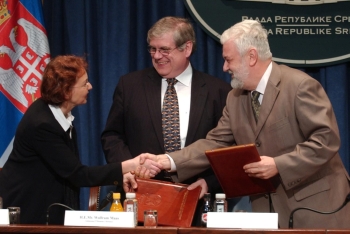- Serbia
Get to know Serbia
- Citizens
Culture and science
Health services
Pension and disability insurance
- Business
Employment
Economy
- Media
- Government
- Contact
Keep in touch
Contact form
Back
Keepin touch
Whether you have a question, comment, suggestion or any problem in the purview of the government, send us your message and we will try to respond as soon as possible. If your problem is not in our purview, we will forward your message to the relevant institution.
Q:
A:
Germany provides €66.8 million in development assistance to Serbia
Belgrade,
19 November 2007
Serbian Minister of Finance Mirko Cvetkovic and representatives of the German government signed today a report on development assistance for Serbia in 2007, worth €66.8 million.
On behalf of Germany, the report was signed by representative of the Federal Ministry for Economic Cooperation and Development Christine de Barros Said and German Ambassador to Belgrade Wolfram Maas.
Cvetkovic told a press conference that the assistance is meant for projects in the areas of energy efficiency, restoration of water supply systems, sustainable economic development, development of a democratic society and increase of efficiency in public administration.
According to Cvetkovic, the total amount is divided in financial help worth €58 million through the German KfW Entwicklungsbank and technical assistance in the amount of €8.8 million through the German organisation for technical cooperation GTZ.
He said that €50 million will be a loan for developing energy efficiency, while €8 million will be a grant for rehabilitation of water supply systems in larger municipalities.
As for technical assistance, Cvetkovic said that €2.2 million is intended for fiscal decentralisation, €1.4 million for youth projects, €2.2 million for supporting judicial reforms, €1.5 million for supporting measures for energy efficiency, €500.000 for modernisation of utility services and €1 million for the fund for experts and studies.
He said it is also envisaged that Serbia draws funds from regional funds for energy efficiency, which are worth €7 million, as well as the fund for technical help worth €9 million.
The Minister explained that these are not funds intended exclusively for Serbia, but rather that depending on projects which it offers, Serbia will be able to benefit from the distribution of these funds.
According to Cvetkovic, Germany is one of the largest donors to Serbia, having provided funds worth €470 million during the past seven years and during the previous two years the help was chiefly meant for the sectors of energy, utility services and finances.
Maas said that in the course of talks on assistance, Serbia showed administrative capacity for EU association, as well as for implementing projects which are necessary for that purpose.
He said that the help is focused on municipalities since these are the smallest units and closest to citizens, and are best informed on priorities in development.
Cvetkovic told a press conference that the assistance is meant for projects in the areas of energy efficiency, restoration of water supply systems, sustainable economic development, development of a democratic society and increase of efficiency in public administration.
According to Cvetkovic, the total amount is divided in financial help worth €58 million through the German KfW Entwicklungsbank and technical assistance in the amount of €8.8 million through the German organisation for technical cooperation GTZ.
He said that €50 million will be a loan for developing energy efficiency, while €8 million will be a grant for rehabilitation of water supply systems in larger municipalities.
As for technical assistance, Cvetkovic said that €2.2 million is intended for fiscal decentralisation, €1.4 million for youth projects, €2.2 million for supporting judicial reforms, €1.5 million for supporting measures for energy efficiency, €500.000 for modernisation of utility services and €1 million for the fund for experts and studies.
He said it is also envisaged that Serbia draws funds from regional funds for energy efficiency, which are worth €7 million, as well as the fund for technical help worth €9 million.
The Minister explained that these are not funds intended exclusively for Serbia, but rather that depending on projects which it offers, Serbia will be able to benefit from the distribution of these funds.
According to Cvetkovic, Germany is one of the largest donors to Serbia, having provided funds worth €470 million during the past seven years and during the previous two years the help was chiefly meant for the sectors of energy, utility services and finances.
Maas said that in the course of talks on assistance, Serbia showed administrative capacity for EU association, as well as for implementing projects which are necessary for that purpose.
He said that the help is focused on municipalities since these are the smallest units and closest to citizens, and are best informed on priorities in development.
-
 Belgrade, 22 January 2025
Belgrade, 22 January 2025Egypt one of Serbia’s closest partners on international stage
-
 Belgrade, 9 July 2024
Belgrade, 9 July 2024Support for 104 associations in diaspora that preserve Serbian language, culture
-
 Belgrade, 15 April 2024
Belgrade, 15 April 2024Competition for StarTech grants open until 31 May
-
 Belgrade, 2 October 2023
Belgrade, 2 October 2023Serbia respects Resolution 1244 and will do everything to preserve peace
-
 Belgrade, 13 September 2023
Belgrade, 13 September 2023Day of Serbian Unity to be celebrated outside borders of Serbia, Republika Srpska for the first time
-
 Belgrade, 8 August 2023
Belgrade, 8 August 2023RSD 24.2m in state aid paid out to citizens affected by storm
-
 Belgrade, 17 June 2023
Belgrade, 17 June 2023Belgrade is doing everything to preserve peace in Kosovo and Metohija
-
 Belgrade, 15 June 2023
Belgrade, 15 June 2023Slovenia will continue to support Serbia on its way to EU
-
 Belgrade, 5 May 2023
Belgrade, 5 May 2023Emergency measures, tightening of conditions for possessing weapons
-
 Belgrade, 3 May 2023
Belgrade, 3 May 2023Three days of mourning in Serbia over tragedy at Vladislav Ribnikar primary school

